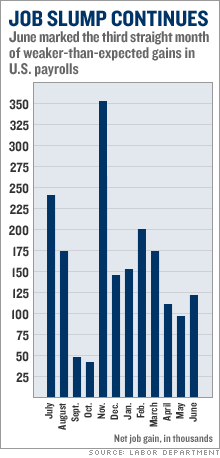Job growth weak again June employment report shows pickup from May reading, but payroll gain again falls short of forecasts; wages show largest 1-year gain since '01. NEW YORK (CNNMoney.com) -- The labor market posted weak job growth for the third straight month, according to a government report Friday, although a jump in wages could keep the Federal Reserve on its course of raising interest rates. There was a net gain of 121,000 jobs for the U.S. economy, according to the Labor Department report, up from the revised 92,000 gain posted in May.
But economists surveyed by Briefing.com had forecast a gain of 160,000 jobs, and this marked the third time in a row that payroll gains fell far short of forecasts. Even with the upward revision in May payroll, the last three months have seen an average of only 108,000 a month added to payrolls, a number seen as less than what is needed to keep pace with population growth. That 3-month gain is down by more than a third from that measure as recently as March. "This is confirmation that one of the remaining elements of strength in the economy - the labor market - is trending slower," said Gregory Miller, chief economist at SunTrust Banks. "It's not a reason to panic. But the Federal Reserve may be nearer to shifting their emphasis to the growth side of the equation rather than the inflation side." Wage pressures raise concerns Still, the unemployment rate stayed at 4.6 percent, in line with forecasts of economists, who had predicted the rate would remain unchanged from the May reading. Of concern to those watching the report for signs of inflation, the average hourly wages rose 0.5 percent to $16.70. That was more than the 0.3 percent increase forecast by economists. It was the second time in three months that there has been a jump of at least that amount, after three years of not seeing a 0.5 percent one-month gain. "We've been expecting wage pressures to build," said Gus Faucher, director of macroeconomics for Moody's Economy.com. "It's not surprising given that the labor market is tightening." The wage gain also represents a 3.9 percent year-over-year rise, the biggest gain in that measure since June 2001. That could be seen as being inflationary, and could prompt the Federal Reserve to keep raising interest rates in an effort to cool the economy and keep prices in check. The first market reaction appeared to be that the weaker than expected jobs number would lessen pressure on the Fed to raise rates. Stock futures and Treasurys initially rallied on the report. But some of those gains quickly fell away as there was more attention given by investors to the wage number. Stocks were lower in mid-morning trading. "I think a hike in August remains on the table even with this weak report, because of the hourly wages," said Anthony Chan, chief economist for JPMorgan Private Client Services. "That increase is worrisome." What will the Fed do? The Fed will get to see the July employment report before its next meeting on Aug. 8, so Friday's report may have a limited impact on the thinking of the central bank's policymakers at that time. Faucher thinks there is a little better than 50-50 chance of another Fed hike in August, but he said that if the July report again shows weaker than expected job growth, it might be able to keep rates unchanged, even if there another bump in wages. "I think it makes another rate hike marginally less likely," he said. "Job gains have been pretty soft over the last three month. While wages have been strong, productivity gains also remain strong, and that's helping to keep unit labor costs in line." SunTrust's Miller, who is one of those predicting an August pause by the Fed, also believes that the wages are a lagging indicator, and that the Fed can therefore keep rates unchanged even if wages continue to increase. "Rising inflation scares the pants off me like it does any economist," said Miller. "But wages are always among the last sectors of the economy to benefit from an expansion." Chan agrees with Miller and Faucher that wages are a lagging indicator, but he said another big jump in wages will force the central bank to respond, despite that lag. He said the Fed has to keep its inflation-fighting credibility with the markets. "No one is arguing that the economy is going to slow in the second half of this year," said Chan. "The only reason they've been raising rates isn't because of an overheating economy. It's been reacting mostly to hourly wages or anything about inflation." Related: State by state unemployment Special report: Your job 2006. |
| |||||||||||


